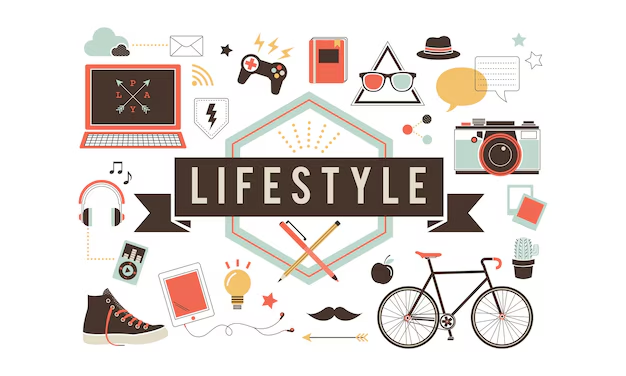The world of lifestyle is constantly evolving, influenced by advancements in technology, changes in societal norms, and shifts in consumer behavior. As we approach 2025, new trends and innovations are emerging that will reshape how we live, work, and interact with the world. From wellness and sustainability to smart homes and digital experiences, here’s a look at the key lifestyle trends that will define the near future.
1. Sustainable Living: Eco-Friendly Choices for a Greener Future
Sustainability has become a key focus for individuals, businesses, and governments alike, and by 2025, sustainable living will be more integrated into everyday life. Consumers are increasingly aware of their environmental footprint and are making conscious choices to reduce waste, conserve resources, and minimize their carbon impact.
From eco-friendly fashion and zero-waste homes to plant-based diets and sustainable energy solutions, the shift toward a greener lifestyle will continue to grow. Sustainable products such as reusable packaging, solar panels, and electric vehicles will become mainstream, with more individuals choosing to support brands and companies that prioritize environmental responsibility.
By 2025, it’s expected that sustainability will not just be a trend but a way of life for most people, as eco-conscious decisions will become more accessible, affordable, and ingrained in the fabric of daily living.
2. Health and Wellness: A Holistic Approach to Well-Being
The importance of health and wellness will continue to rise as people increasingly prioritize physical, mental, and emotional well-being. By 2025, wellness will encompass more than just physical fitness—it will include mental health, emotional balance, social connections, and mindfulness practices.
Fitness tracking devices, personalized nutrition plans, and mental health apps will evolve to provide more customized, holistic wellness experiences. People will continue to seek ways to improve sleep quality, reduce stress, and adopt healthier habits, with advancements in wearable technology offering real-time data on body metrics, activity levels, and sleep patterns.
Additionally, mindfulness and meditation will become mainstream, with virtual wellness programs and AI-driven health coaches guiding individuals to maintain a balanced lifestyle. As mental health becomes a top priority, digital tools that promote relaxation and self-care will play a key role in overall wellness.
3. Smart Homes and IoT: The Rise of Connected Living
Smart homes will be an integral part of modern living by 2025, thanks to the rapid growth of the Internet of Things (IoT). Smart devices—from refrigerators and thermostats to security cameras and voice assistants—will create more connected and efficient living environments.
By 2025, homes will be fully integrated with smart technology, allowing homeowners to automate daily tasks, improve energy efficiency, and enhance security. For example, smart thermostats will learn household preferences and adjust the temperature accordingly, while voice-controlled assistants will handle everything from controlling lights and appliances to managing grocery orders.
Additionally, IoT devices will enable real-time monitoring of home health, such as air quality, water usage, and overall energy consumption, helping individuals live more sustainably and efficiently. This connected living environment will provide greater convenience, comfort, and safety for people everywhere.
4. Remote Work and Digital Nomadism: The New Era of Flexibility
The COVID-19 pandemic accelerated the adoption of remote work, and by 2025, flexible work arrangements will be the norm for many industries. Digital nomadism—the lifestyle of working remotely while traveling—will continue to grow as more individuals seek work-life balance and the freedom to explore new places.
Technology will be the backbone of this new era, enabling workers to stay connected, collaborate with teams, and access resources from anywhere in the world. By 2025, remote work tools and platforms will be more advanced, offering seamless communication, project management, and virtual collaboration.
As the boundaries between work and personal life continue to blur, companies will adopt hybrid models that allow employees to choose when and where they work. This flexibility will lead to increased job satisfaction and a shift in how people prioritize work-life balance.
5. Digital Experiences and Virtual Reality (VR): The Future of Entertainment
As technology continues to advance, digital experiences will become an essential part of our lifestyles. By 2025, virtual reality (VR), augmented reality (AR), and mixed reality (MR) will redefine entertainment, gaming, shopping, and even social interactions.
In the realm of entertainment, VR will offer fully immersive experiences, from gaming and virtual tourism to live events and concerts. Consumers will be able to attend concerts, visit museums, and explore new destinations without leaving their homes, all while interacting with others in a digital space.
Additionally, VR and AR will transform shopping experiences, with virtual fitting rooms allowing customers to try on clothes and makeup virtually before making a purchase. The rise of the metaverse—a shared, immersive virtual world—will provide a new way for people to socialize, shop, and entertain themselves in an interconnected, digital universe.
6. Personalized Shopping and AI-Driven Consumerism
AI and data analytics will revolutionize how people shop and consume products by 2025. Retailers will use AI to provide hyper-personalized shopping experiences, offering recommendations based on individual preferences, purchase history, and even browsing behavior.
AI-powered virtual assistants will help consumers make informed purchasing decisions, providing product reviews, price comparisons, and even styling tips. In addition, augmented reality (AR) will allow customers to visualize products in their homes before buying, enhancing the online shopping experience.
Personalized subscription services for everything from food and clothing to entertainment and beauty products will continue to grow, catering to consumers who value convenience, customization, and curated experiences.
7. Sustainable Fashion and Conscious Consumerism
The fashion industry is undergoing a transformation, with sustainability and ethical practices taking center stage. By 2025, consumers will have access to more eco-friendly and sustainable fashion choices, as brands shift towards using recycled materials, ethical labor practices, and sustainable production methods.
Fashion rental services, second-hand marketplaces, and clothing swaps will become more popular, reducing the environmental impact of fast fashion. Consumers will embrace minimalist wardrobes and prioritize quality over quantity, with durable, long-lasting pieces becoming the foundation of modern wardrobes.
Conscious consumerism will extend beyond fashion, with people making more mindful choices about the products they purchase, considering factors like sustainability, ethical sourcing, and fair trade practices. This shift will drive demand for products that align with values of environmental responsibility and social justice.
8. Travel and Sustainability: Eco-Friendly Exploration
Sustainable travel will become a top priority for global travelers by 2025. With growing awareness of climate change and environmental issues, more people will opt for eco-friendly travel options that minimize their carbon footprint.
Electric vehicles (EVs) and electric planes will play a significant role in reducing travel-related emissions, while sustainable accommodations, such as eco-resorts and zero-waste hotels, will become more widespread. In addition, travelers will increasingly seek local, authentic experiences that support local communities and reduce tourism’s impact on fragile ecosystems.
The rise of “slow travel,” where travelers spend more time exploring a destination in-depth rather than rushing through multiple locations, will encourage more mindful exploration of the world.
9. Aging Populations and Senior Care Innovations
With aging populations around the world, innovations in senior care will continue to grow by 2025. Technology will play a vital role in improving the quality of life for older adults, providing solutions for remote health monitoring, medication management, and social connection.
Smart home technology will allow seniors to live independently for longer, with automated systems helping with tasks like medication reminders, fall detection, and emergency alerts. Telemedicine will offer remote consultations, allowing older adults to access healthcare without needing to leave their homes.
Social isolation will also be addressed through digital platforms that connect seniors with family, friends, and community resources. Virtual reality (VR) will help seniors experience immersive environments that promote mental and emotional well-being, providing a sense of connection and engagement.
Conclusion: A Dynamic Future of Lifestyle
As we approach 2025, the way we live, work, and interact with the world will be shaped by advancements in technology, a greater emphasis on sustainability, and a focus on health and wellness. From eco-friendly living and personalized wellness experiences to smart homes and digital experiences, the lifestyle of the future will be more interconnected, conscious, and adaptable.
By embracing these trends and innovations, we will create a more sustainable, efficient, and fulfilling way of living that reflects our values, enhances our well-being, and prepares us for a rapidly changing world.



